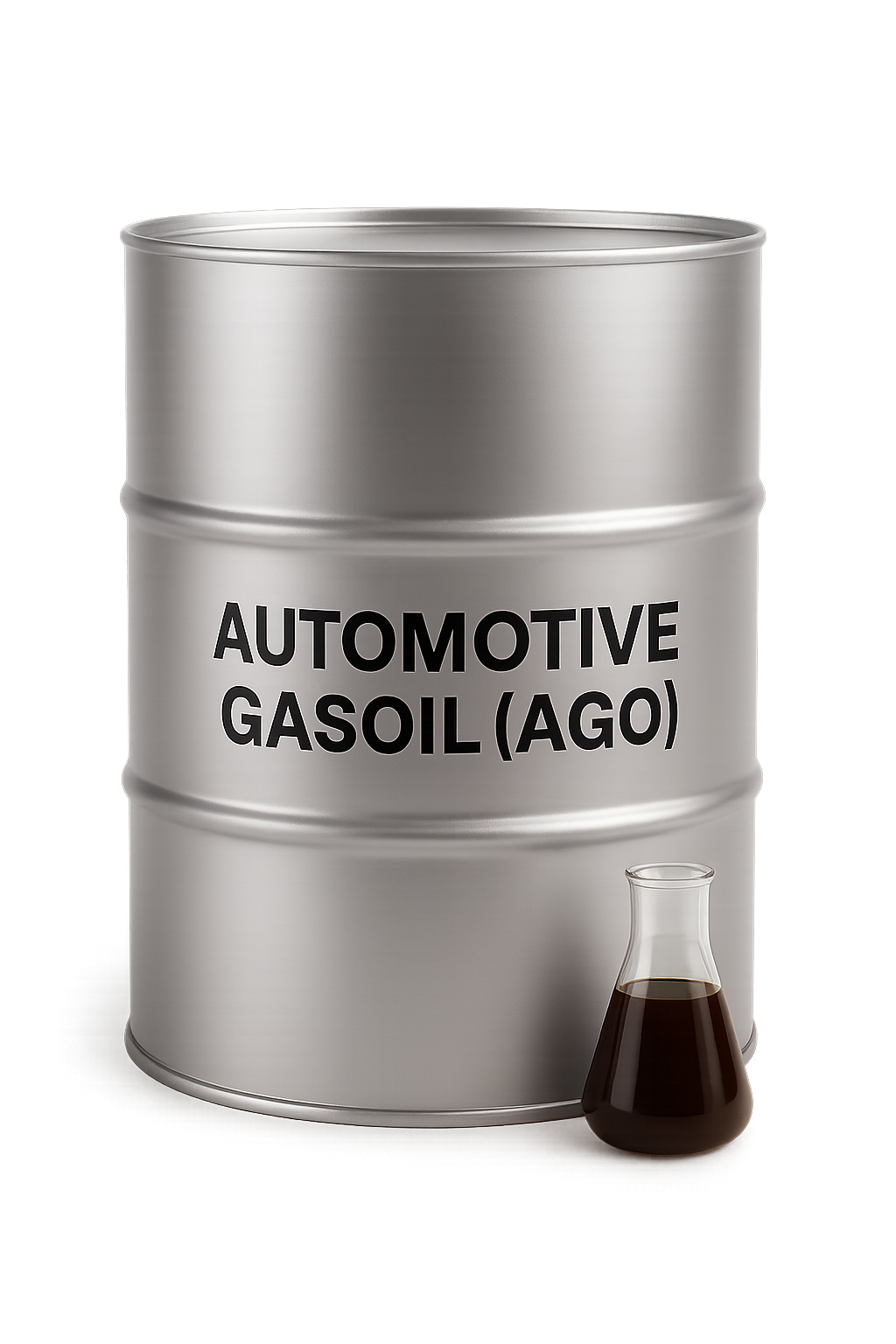
AGO
Overview
Automotive Gas Oil (AGO) is a middle-distillate petroleum product used primarily as fuel in diesel engines for vehicles, trucks, buses, and industrial machinery. Unlike heavy residual fuels, AGO is a lighter, cleaner-burning diesel fraction that provides reliable performance across transport and industrial applications.
Technical Characteristics
- Grade: Automotive Gas Oil (diesel-type distillate fuel)
- Appearance: Clear to light yellow liquid
- Density @ 15°C: 0.820–0.870 kg/L
- Cetane Number: Minimum 45–51 (depending on regional standard)
- Sulfur Content:
- Low Sulfur AGO (LSAGO): ≤ 0.25% by weight
- Ultra-Low Sulfur AGO (ULSAGO): ≤ 0.05% by weight (50 ppm)
- Flash Point: Minimum 55°C (ASTM D93 / EN ISO 2719)
- Viscosity @ 40°C: 2.0–4.5 mm²/s
- Pour Point: −6°C to −18°C depending on grade
- Cold Filter Plugging Point (CFPP): Regional (−5°C to −20°C typical)
- Ash Content: ≤ 0.01% by mass
Specifications & Standards
- Conforms to ASTM D975, ISO 8217, and EN 590 (regional variants)
- Meets emission standards where regulated (Euro III–VI equivalents depending on sulfur grade)
Applications
- Automotive: Fuel for diesel-powered passenger cars, buses, and light commercial vehicles
- Transport & Logistics: Widely used in freight trucks and long-haul vehicles
- Industrial & Construction: Fuel for heavy-duty engines, off-road equipment, and agricultural machinery
- Marine (Inland Vessels): Suitable for small vessels requiring middle distillates
Performance Advantages
- Versatility: Can be used across road, industrial, and light marine applications
- Lower Sulfur Grades: Reduce particulate and sulfur oxide emissions, compatible with emission-control technologies
- Good Ignition Quality: Ensures efficient combustion in compression-ignition engines
- Seasonal Adaptability: Available in winterized grades for cold climate operation
Handling & Storage
- Must be stored in clean, sealed tanks free from water and microbial contamination
- Recommended to keep storage below 40°C to avoid oxidation and fuel degradation
- Requires regular filtration before end-use to maintain fuel cleanliness
Compliance & Testing
- Verified against ASTM, EN, and ISO standards for cetane number, sulfur content, and lubricity
- Typically accompanied by third-party Quality & Quantity (Q&Q) inspection (e.g., SGS, CIQ, Intertek)
Frequently Asked Questions
1. lobortis augue porta eu. Maecenas eget mauris tristique ?
Praesent aliquet et quam at tempus. Orci var natoque penati magnis disw parturien monascetur ridiculus condimentum pharetra interdum.
2. Sobortis augue porta eu. Maecenas eget mauris tristique ?
Praesent aliquet et quam at tempus. Orci var natoque penati magnis disw parturien monascetur ridiculus condimentum pharetra interdum.
3. Cobortis augue porta eu. Maecenas eget mauris tristique ?
Praesent aliquet et quam at tempus. Orci var natoque penati magnis disw parturien monascetur ridiculus condimentum pharetra interdum.
4. Dobortis augue porta eu. Maecenas eget mauris tristique?
Praesent aliquet et quam at tempus. Orci var natoque penati magnis disw parturien monascetur ridiculus condimentum pharetra interdum.
5. Dobortis augue porta eu. Maecenas eget mauris tristique?
Praesent aliquet et quam at tempus. Orci var natoque penati magnis disw parturien monascetur ridiculus condimentum pharetra interdum.
6. Dobortis augue porta eu. Maecenas eget mauris tristique?
Praesent aliquet et quam at tempus. Orci var natoque penati magnis disw parturien monascetur ridiculus condimentum pharetra interdum.